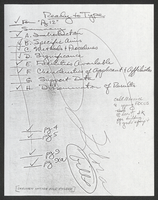Search the Special Collections and Archives Portal
Search Results
Vern Lanegrasse Papers
Identifier
Abstract
The Vern Lanegrasse Papers (1961-2010) consist of materials from the Brotherhood of the Knights of the Vine and the California Restaurant Writers Association as well as event programs, menus, and other materials related to food and wine.
Archival Collection
UNLV Libraries Collection of Hollywood Casino Corporation Promotional Materials and Reports
Identifier
Abstract
The UNLV Libraries Collection of Hollywood Casino Corporation Promotional Materials and Reports includes annual reports, prospectus, 10-K forms, 10-Q forms, equity reports, financial research, press releases, press kits, a stockholder meeting notice, and promotional materials for Hollywood Casino Corporation in Dallas, Texas, dating from 1992 to 2001.
Archival Collection
Joseph LaMar Foremaster Photograph Collection
Identifier
Abstract
The Joseph LaMar Foremaster Photograph Collection includes black-and-white photographic prints and negatives of structures at the Old Ranch (Stewart Ranch) in Las Vegas, Nevada from approximately 1920 to 1939 when the Foremaster family lived and worked on the land.
Archival Collection
Aaron Williams Photograph Collection
Identifier
Abstract
The Aaron Williams Photograph Collection (approximately 1968 to 1983) consists of three black-and-white photographic prints. Two of the images are of the groundbreaking ceremony of the Senior Citizens’ Center with Las Vegas, Nevada Mayor Oran Gragson, and the third of three unidentified individuals.
Archival Collection
Jarbidge, Nevada Community Archives Collection
Identifier
Abstract
The Jarbidge, Nevada Community Archives Collection contains scanned images from seven archival collections and document the community of Jarbidge, Nevada from approximately 1910 to 2006. The materials were collected from various families living in Jarbidge in 2006 as part of a project led by Carrie Townley Porter. The images depict early Jarbidge structures, surrounding landscape, the Elkoro Mine, and residents of the area. Also included are images of certificates, correspondence, and newspaper articles relating to the families' histories. Also included in the collection are written summaries of ten oral history interviews of Jarbidge residents conducted in 2006. This collection contains digital surrogates only; the owners and Jarbidge Community Archives retain the originals.
Archival Collection
Tony Wuehle Collection
Identifier
Abstract
The Tony Wuehle Collection documents the activities of freelance writer, college president, and poker expert Edwin "Tony" Wuehle of Michigan and Las Vegas, Nevada, between the years of 1950 to 2007. The collection consists of copies of Wuehle's regular columns, newsletters, and special articles as they were published in various journals and newspapers, especially those related to poker, the International Home and Private Poker Player's Association (IH3PA), education administration, and religious concerns.
Archival Collection
Hazel Baker Denton Papers
Identifier
Abstract
Hazel Baker Denton Papers (1907-1957) contain correspondence, family artifacts, scrapbooks, newspaper clippings, and family biographical information. Included are journals that chronicle the years Denton served as an Assemblywoman for the Nevada State Legislature and a copy of her book, Ironing Day, her newspaper columns, and speeches.
Archival Collection

Wayne Tanaka oral history interview: transcript
Date
Archival Collection
Description
Oral history interview with Wayne Tanaka conducted by Ayrton Yamaguchi, Vanessa Concepcion, Kristel Peralta, Cecilia Winchell, and Stefani Evans on March 12, 2021 for Reflections: The Las Vegas Asian American and Pacific Islander Oral History Project. Wayne shares his family's heritage and history as Japanese Hawaiians and discusses his father's internment during World War II. He shares his background growing up in Lahaina, Maui, Hawai'i and how he came to live in Las Vegas. Wayne discusses his career as an educator for the Clark County School District and talks about his life in Las Vegas with his wife and daughters. Subjects discussed include: Las Vegas Buddhist Sangha; Executive Order 9066; Sunset High School; Boulder Dam Area Council.
Text

University of Nevada, Las Vegas law school establishment: correspondence
Date
Archival Collection
Description
Folder from the Flora Dungan Papers (MS-00193) -- Series 4. University of Nevada Regents Material.
Text

Emilia Marquez oral history interview: transcript
Date
Archival Collection
Description
Oral history interview with Emilia Marquez conducted by Maribel Estrada Calderón on July 5, 2019 for the Latinx Voices of Southern Nevada Oral History Project. Claytee D. White and Emily Lucile are also present during the interview. Emilia Marquez was born in the United Stated and raised in Alexandria, Virginia, where her father worked as a bricklayer, until the age of twelve, when her father decided to move the family back to Uruguay. She describes acclimating to her new life in middle school and her shift from being perceived as an outsider in Uruguay to accepting Uruguay as home. She describes life in Uruguay and the positions that her family held while living there. After meeting and marrying her husband they trained to work in a casino. She trained as a slot machine operator, and her husband trained as a dealer. This eventually led them to leave Uruguay for the U.S. After the encouragement of her father and mother, she moved with her mother to Las Vegas to work in the casino industry. She describes working as a change person at the Luxor before moving to the newly opened Palms, where she worked until she left it to work at the Wynn. She ends the interview talking about various Uruguayan dishes and traditions, and a brief history of Uruguay. Subjects discussed in this interview: Uruguay, immigration, Las Vegas Strip, Latinx, Luxor.
Text
